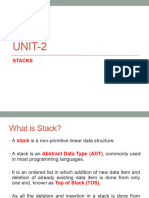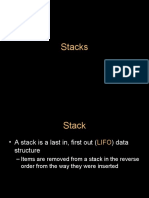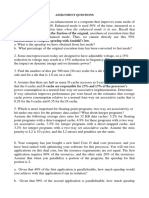0% found this document useful (0 votes)
174 views23 pagesStack Basics for Beginners
This document discusses stacks and their implementation. It defines key stack terms like LIFO, push, pop, top, overflow and underflow. It provides examples of stacks in real life like a stack of books. The basic stack operations of push, pop and peek are explained. Finally, it demonstrates how to implement a stack using an array with functions for creating the stack, checking if it's empty/full, and pushing/popping elements.
Uploaded by
Wani SyazwaniCopyright
© Attribution Non-Commercial (BY-NC)
We take content rights seriously. If you suspect this is your content, claim it here.
Available Formats
Download as PPT, PDF, TXT or read online on Scribd
0% found this document useful (0 votes)
174 views23 pagesStack Basics for Beginners
This document discusses stacks and their implementation. It defines key stack terms like LIFO, push, pop, top, overflow and underflow. It provides examples of stacks in real life like a stack of books. The basic stack operations of push, pop and peek are explained. Finally, it demonstrates how to implement a stack using an array with functions for creating the stack, checking if it's empty/full, and pushing/popping elements.
Uploaded by
Wani SyazwaniCopyright
© Attribution Non-Commercial (BY-NC)
We take content rights seriously. If you suspect this is your content, claim it here.
Available Formats
Download as PPT, PDF, TXT or read online on Scribd
/ 23
























































































